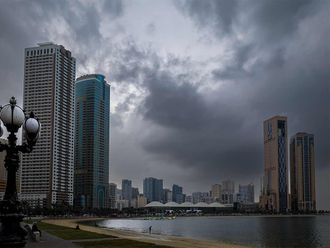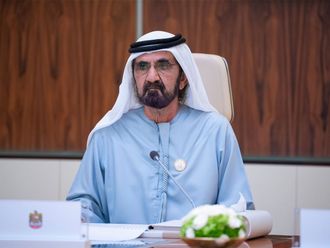Abu Dhabi: The secret behind the UAE’s success and its impressive stature on the global stage lies in the visionary leadership of Shaikh Zayed Bin Sultan Al Nahyan, the founding father of the UAE, a leading global expert in embedding foresight into government said on Wednesday.
“Shaikh Zayed, founding President of the UAE, had anticipated early on that the United Arab Emirates had to be prepared for unexpected changes coming our way, ensuring the government is alert for possible shocks,” Peter Ho, senior adviser to Singapore’s Centre for Strategic Futures, told a packed house at the majlis of His Highness Shaikh Mohammad Bin Zayed Al Nahyan, Crown Prince of Abu Dhabi and Deputy Supreme Commander of the UAE Armed Forces.
Peter Ho explained that Shaikh Zayed had known early on that “situations change, a friend might become an enemy, and an enemy might one day become a friend. So life is inconsistent and ever-changing”.
Ho delivered an insightful lecture titled, ‘Governing for the Future: What governments can do’, which looked at how to ensure government is alert and prepared for possible ‘shocks’. He stressed the importance of using a whole-of-government approach to better manage complexity, respond to challenges and deal with strategic risks.
Ho said an enduring challenge to governments is one of strategic surprise and, like most countries, Singapore has encountered many. “There are as many unexpected problems ahead as there were in the past.”
Ho said Nicholas Nassim Taleb described, perhaps most famously, a kind of surprise that is extremely hard to predict but has game-changing repercussions. “This is called a Black Swan. Some examples of Black Swans include the 9/11 attacks and the collapse of Lehman Brothers that sparked a global financial meltdown. There are other kinds of surprises that continue to shock us, and many stem from cognitive biases.”
He added shocks and surprises will come quicker and more frequently now because our world is so interconnected and complex. “The nature of a complex world makes it even harder to predict what would happen because much of the behaviour that is observed in complex systems is emergent. It is hence tricky to navigate such a world, and it is helpful to be equipped with the appropriate tools and mind-sets to survive and weather surprises well.”
Ho said there are many tools to help equip governments to navigate the complex world we live in. “One way is through foresight thinking. In Singapore, one of the foresight tools we use is Scenario Planning. Scenarios help illustrate plausible futures — they are not predictions — but they serve as a tool to think the unthinkable, to nudge policy-makers into thinking outside their comfort zones and challenge their mental models. The process of creating the scenarios themselves is a good exercise to help officers carefully examine the forces that will impact us and how the inter-mingling of these forces could result in very different outcomes,” Ho said.
Ho argued that Scenario Planning alone is not sufficient to help us deal with a complex and fast-changing world; other foresight tools that can deal with more immediate or mid-term concerns are also used. “These tools include horizon scanning, back-casting, sign-posting, and more, and there are also platforms that can aid in these efforts, such as digital horizon scanning tools. While foresight thinking may not be able to reduce surprise, we believe it can help reduce their impact when they do happen.”
Ho concluded that a complex world also gives rise to complex problems; some quarters call them Wicked Problems. “These problems are complex because they have no clear solution, and they require many stakeholders to come together to solve them. Climate change, ageing, pollution — these are examples of Wicked Problems. In order to deal with them, the approach must be from a systems-level. A strong capability in foresight is essential. In Singapore, the Government tackles such problems in a Whole-of-Government way. While easier said than done, it is possible, and Singapore has managed to do so in several ways, such as in dealing with issues in urban planning and transportation,” he said.











